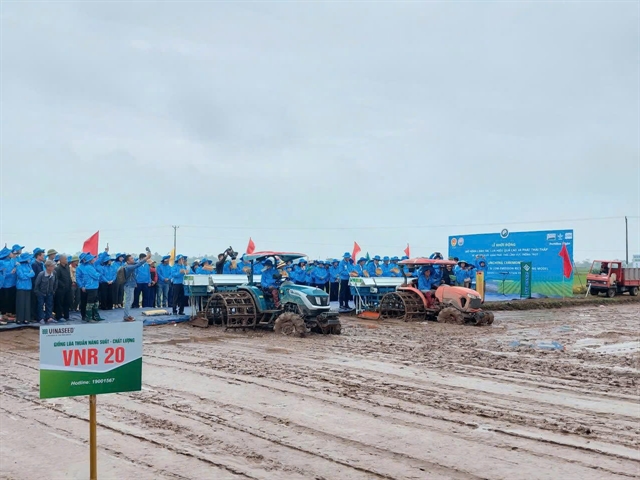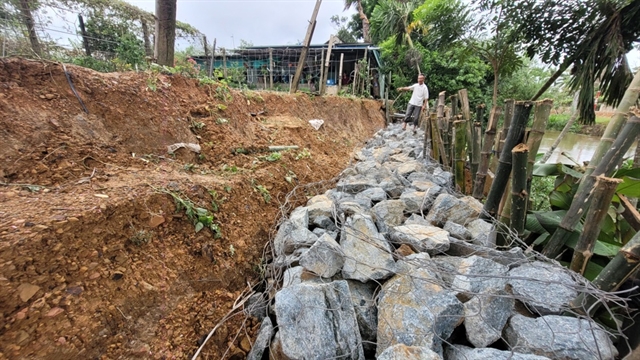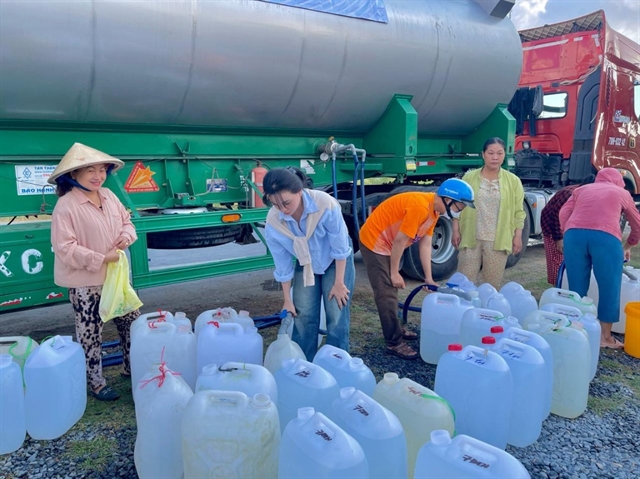 Environment
Environment

 |
| The Cà Mau provincial government is trying to temporarily reinforce collapsed roads to ensure traffic and agricultural product transactions for farmers. — VNS Photo Lê Văn Châu |
MEKONG DELTA — Despite possessing an intricate river system, people and agriculture in the Mekong Delta are facing severe drought and saltwater intrusion.
Kiên Giang and Cà Mau provinces are two coastal provinces severely affected by drought and salinity. Dry canals cause many traffic routes to collapse and separate. People's lives are turned upside down due to water shortages, traffic isolation and production stagnation.
Lê Trung Hậu, a farmer in Cà Mau Province's Trần Văn Thời District, said, "saltwater intrusion has encroached deeply into the mainland causing my 10 hectares of rice ready to be harvested to die due to salinity. I lost about VNĐ200 million (US$8,000).”
Not only that, about 10 days ago, due to prolonged extreme weather, many arterial roads in Khánh Hải Commune collapsed and became impassable, Hậu said.
Similarly, Trần Sáu, a farmer in Khánh Hải Commune, said traffic was cut off, making it impossible for traders to come and buy coconuts from him. "If no traders come in to buy next week, thousands of my coconut trees will die due to saltwater intrusion."
Besides facing salinity intrusion, people in Cà Mau also face the risk of lack of water for daily life and irrigation because the Government's salinity prevention sluice gates have been closed to limit the rate of saltwater intrusion, causing the water level in the canals to drop dramatically, and some canals have even dried out.
Cà Mau Province has more than 3,000 households lacking fresh water for daily use. People have to buy water from boats carrying water from other places.
To have water for daily use, people are completely dependent on water trucks from neighbouring provinces, even from city and provinces hundreds of kilometres away such as HCM City, Bình Dương and Tây Ninh.
Under the harsh sun, Lê Thị Hằng in Cà Mau Province patiently waited for more than an hour to fill two 30-litre cans of fresh water from water tankers from HCM City.
Hằng said that these days her family was completely dependent on water trucks from many provinces in the Southeast. Without these water trucks, she would not be able to find water.
Khánh Hải Commune is considered an area heavily affected by landslides and subsidence. In this area alone, there have been more than 250 landslides and road collapses on more than 7.1km.
Phạm Thành Được, Chairman of Khánh Hải Commune People's Committee, said, “the rice production area damaged by extreme weather has caused farmers in the area to lose up to VNĐ34 billion.”
Similar to Cà Mau, U Minh Thượng District in Kiên Giang is also facing a drought situation.
Lê Bảy, a farmer in U Minh Thượng District, said, “this year, severe drought and saltwater intrusion have caused many roads to collapse and trucks cannot come to buy agricultural products. Now when I want to sell bananas and other crops, I have to transport them by motorbike to the point of sale, which costs a lot.”
People's incomes here depend on agricultural products, but now production is much more difficult and labour-intensive than before.
According to Huỳnh Thanh Tuấn, Deputy Head of the Department of Agriculture and Rural Development of U Minh Thượng District, 7,000 hectares are planted with vegetables and fruit trees in An Minh Bắc and Minh Thuận communes, including about 3,000 hectares of bananas. All agricultural products are in harvest season.
Farmers have to find ways to transport bananas and vegetables by motorbike to selling points as a temporary solution, but the costs are high and farmers suffer a lot of damage.
Serious water shortages and saltwater intrusion encroaching deep into the mainland also occur in other provinces such as Tiền Giang, Long An, Bến Tre and Sóc Trăng.
Phạm Tấn Đạo, head of Sóc Trăng Province's Irrigation sub-department, said that currently in the province, about 1,000 hectares of rice were affected by water shortages combined with alum poisoning.
 |
| People in the Mekong Delta provinces have to buy water from water trucks to serve daily activities. — VNS Photo Lê Văn Châu |
Urgent solutions to combat drought and saltwater intrusion
In order for farmers to be able to sell agricultural products that have reached harvest season, Được said he was directing relevant agencies to coordinate with people to temporarily fix small landslides and subsidence points so that people could travel and reconnect trade.
In the long term, the locality would need support from the Provincial People's Committee and the central Government to overcome major landslides.
Phan Hoàng Vũ, director of the Cà Mau Province's Department of Agriculture and Rural Development, said that the province had a plan to request emergency support of nearly VNĐ40 billion from the central Government to invest in water tanks and extend pipes, and repair water supply stations.
From the emergency support fund, the province would allocate 758 water tanks to 1,344 households without water containers and establish 46 centralised water supply points. For nearly 1,000 households living near centralised water supply works but where water pipes are not accessible, the province would extend the pipes by about 83.5km so that people could have water to use, Vũ said.
Similarly, the Sóc Trăng provincial government will also extend water supply pipes to provide water to households in saltwater intrusion areas.
Meanwhile, Dương Quốc Khởi, vice chairman of the People's Committee of U Minh Thượng District, said the locality was actively reviewing points at risk of landslides to promptly relocate and support people affected by landslides.
Trần Văn Lâu, Chairman of the Sóc Trăng People's Committee, said that he had asked relevant departments and local leaders to focus on guiding people to use fresh water economically. When the salinity outside river mouths drops low, the province would urgently operate a water storage system to ensure supply for crops.
Besides temporary solutions, Trần Ngọc Tam, deputy chairman of the Bến Tre Province People's Committee, also proposed the idea of bringing fresh water to the Mekong Delta from provinces and cities in the Southeast.
According to Tam, water sources from Dầu Tiếng Lake, Sài Gòn River and Đồng Nai River are very abundant. The elevation of this river system is much higher than Bến Tre Province and many areas in the Mekong Delta, so channeling or installing a water pipeline system to the delta region is very convenient. — VNS